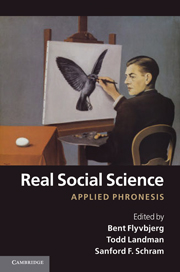Book contents
- Frontmatter
- Contents
- Figures
- Tables
- Contributors
- Acknowledgements
- 1 Introduction: new directions in social science
- Part I Theory and method
- 2 Phronetic social science: an idea whose time has come
- 3 Phronesis and narrative analysis
- 4 The feel for power games: everyday phronesis and social theory
- 5 Phronesis, projects and power research
- Part II Applied phronesis
- 6 Why mass media matter and how to work with them: phronesis and megaprojects
- 7 Power and conflict in collaborative research
- 8 Unsettling a settler society: film, phronesis and collaborative planning in small-town Canada
- 9 Phronesis and critical policy analysis: Heathrow's ‘third runway’ and the politics of sustainable aviation in the United Kingdom
- 10 Amnesty in the age of accountability: Brazil in comparative context
- 11 Feminist phronesis and technologies of citizenship
- 12 Making the teaching of social justice matter
- 13 Spatial phronesis: a case study in geosurveillance
- 14 Important next steps in phronetic social science
- Index
- References
7 - Power and conflict in collaborative research
Published online by Cambridge University Press: 05 June 2012
- Frontmatter
- Contents
- Figures
- Tables
- Contributors
- Acknowledgements
- 1 Introduction: new directions in social science
- Part I Theory and method
- 2 Phronetic social science: an idea whose time has come
- 3 Phronesis and narrative analysis
- 4 The feel for power games: everyday phronesis and social theory
- 5 Phronesis, projects and power research
- Part II Applied phronesis
- 6 Why mass media matter and how to work with them: phronesis and megaprojects
- 7 Power and conflict in collaborative research
- 8 Unsettling a settler society: film, phronesis and collaborative planning in small-town Canada
- 9 Phronesis and critical policy analysis: Heathrow's ‘third runway’ and the politics of sustainable aviation in the United Kingdom
- 10 Amnesty in the age of accountability: Brazil in comparative context
- 11 Feminist phronesis and technologies of citizenship
- 12 Making the teaching of social justice matter
- 13 Spatial phronesis: a case study in geosurveillance
- 14 Important next steps in phronetic social science
- Index
- References
Summary
Introduction
There are many ways to practise phronetic social science. One way is what social scientists frequently refer to as collaborative research (CR). In this form of phronetic research, the non-academic stakeholders of a research project are integrated into the processes of planning, implementing and interpreting a study. Social scientists who work in the collaborative tradition (Freire [1970] 1999; Addams 2002; Minkler and Wallerstein 2003; Stoecker 2005; Strier 2007) have long insisted that many of the problems of contemporary mainstream knowledge production may be overcome by adopting a collaborative approach to research (Shdaimah, Stahl and Schram 2009). Their ideas have an obvious affinity with Flyvbjerg's theory of phronesis. One primary concern that arises in such collabor-ations is conflict, which is often a manifestation of power. In this chapter, we examine consensus and engagement approaches to conflict, using our own CR project as a case study.
In Making Social Science Matter (MSSM), Bent Flyvbjerg (2001) is careful to point out ‘that the methodological guidelines [that he offers] should not be seen as methodological imperatives’ (129). Phronetic social science can be practised using a variety of methods as long as it ‘effectively deals with public deliberation and praxis’ (129); that is, as long as it is done in a manner that invites engagement with issues that matter to the communities and other stakeholders. Collaborative research can be seen as the very model of phronetic research because these components are built into it by design. Collaborative research not only adds a praxis-oriented scientific voice to the public debate, but actively engages debate around issues that matter to stakeholders while developing and carrying out research. Any CR project includes, as Flyvbjerg puts it, a ‘polyphony of voices’ in all the decision-making stages of research. And it does so ‘with no voice, including that of the researcher, claiming final authority’ (2001: 139). When knowledge production is grounded in a polyphony of equally authoritative voices, the process by which these voices speak to each other and are negotiated becomes an important aspect of conducting the research project. One consequence of constantly negotiating various stakeholder interests is that power dynamics are more likely to be of immediate importance. How one engages conflict and the power relations in such collaborations is at least as important as the outcome and merits its own analysis.
Information
- Type
- Chapter
- Information
- Real Social ScienceApplied Phronesis, pp. 122 - 136Publisher: Cambridge University PressPrint publication year: 2012
References
Accessibility standard: Unknown
Why this information is here
This section outlines the accessibility features of this content - including support for screen readers, full keyboard navigation and high-contrast display options. This may not be relevant for you.Accessibility Information
- 4
- Cited by
